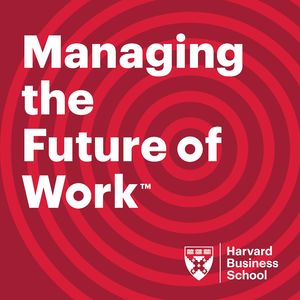
 Erik Brynjolfsson on how AI is rewriting the rules of the economy
Erik Brynjolfsson on how AI is rewriting the rules of the economyThe Stanford economist unpacks AI’s impact on work and productivity, its limitations, and wider implications. He also lays out what organizations can do to get more out of the technology as they invest in the transformation. And he updates his longstanding research into augmenting traditional GDP metrics to capture the value of digital goods and services.
 Cal Newport on slow productivity and next-wave AI
Cal Newport on slow productivity and next-wave AIJoe Fuller welcomes back the Georgetown computer scientist and leading observer of knowledge work, who reprises his argument against busyness as the default mode. Also, cracking the productivity code, parsing AI's potential, and better work-life balance.
 David Deming on workforce shifts and the future of college
David Deming on workforce shifts and the future of collegeAI's early impact on the labor market: Are claims of revolutionary change overblown? The Harvard economist presents the long view on technological disruption and updates the post-secondary picture.
 Ed Glaeser on Cities, Work, and Why America Struggles to Build
Ed Glaeser on Cities, Work, and Why America Struggles to BuildThe Harvard urban economist assesses the post-Covid health of cities, rural development, zoning and the stagnation of the U.S. housing industry, the impact of AI, and more.
 Positive prompts: Sal Khan on AI in the classroom and beyond
Positive prompts: Sal Khan on AI in the classroom and beyondWill the technology democratize access to world-class education or increase inequality? Khan's journey from highly informed skeptic to champion of ethical AI. The HBS graduate and Khan Academy founder explains his nonprofit's pioneering strategy. Also, workforce development, competency-based learning, and skills-based hiring.
 OneTen CEO Debbie Dyson: Why "skills-first" builds a better workforce
OneTen CEO Debbie Dyson: Why "skills-first" builds a better workforceIn taking aim at degree inflation, the corporate-led good jobs coalition looks to boost economic opportunity, address skills gaps, and create a more equitable and inclusive workforce. OneTen helps employers navigate the uncertain new normal of hiring and advancement while expanding their talent pipelines.
 Nicholas Bloom on the unbundled workplace
Nicholas Bloom on the unbundled workplaceThe Stanford economist explains the momentum behind the work-from-home trend, how to manage a hybrid staff, and the new workforce geography. Also, the tech-driven evolution of remote work and the rise of the CHRO.
 Hospitality at work: Bridging opportunity and innovation
Hospitality at work: Bridging opportunity and innovationHow do you foster inclusion, economic mobility, and a sense of purpose across a global organization with both franchise and direct employees? Laura Fuentes, Hilton CHRO, on supporting frontline workers and promoting from within in a traditionally high-turnover business; meeting the needs of a diverse clientele with a diverse workforce; skills development; automation; and leveraging employee feedback.
 Beyond exit interviews: Knowing why workers quit makes for better job matches
Beyond exit interviews: Knowing why workers quit makes for better job matchesThinking of employees as 'hiring' their jobs opens the way to a detailed analysis of worker motivations, frustrations, and long-term goals, which can reduce costly turnover and make career development a collaborative process. Harvard Business School professor Ethan Bernstein and Michael Horn, cofounder of the Clayton Christensen Institute, explain how.
 Guest Episode: Joseph Fuller on The Gartner Talent Angle
Guest Episode: Joseph Fuller on The Gartner Talent AngleManaging the Future of Work co-chair Joseph Fuller delves into what’s driving and limiting the practice of skills-based hiring. The discussion ranges from degree inflation and HR automation to workforce demographics, skills-based promotion and employee retention. Also, how technology can accelerate the adoption.
 The business logic of supporting carers in the workforce
The business logic of supporting carers in the workforceEmployers can benefit by remapping their talent strategies to match the realities of workers with caregiving responsibilities. Bill Kerr is joined by his Managing the Future of Work co-chair and podcast co-host, Joe Fuller, lead author of the project’s latest report, Hidden Workers: The Case for Caregivers.
 Worker welfare: From theory to tangible good
Worker welfare: From theory to tangible goodGood Business Lab cofounder Anant Nyshadham on demonstrating the ROI of better worker conditions and getting from academic exercise to large-scale implementation.
 Collective counsel: Corporate law's changing workforce and culture
Collective counsel: Corporate law's changing workforce and cultureVinson and Elkins' Keith Fullenweider on recruiting team players, boosting collaboration and soft skills through targeted training and mentorship, prioritizing mental health and work-life balance, automating judiciously, and making return-to-office work.
 Help Wanted: Workforce boards face greater demands and more strings
Help Wanted: Workforce boards face greater demands and more stringsWith legislative changes looming, federally funded boards must juggle the demands of workforce training, economic development, and long-term systemic goals while ensuring accountability to both local communities and federal oversight. Brad Turner-Little, President and CEO of the National Association of Workforce Boards, explains.
 Marshall Goldsmith outlines the humble path to better leadership
Marshall Goldsmith outlines the humble path to better leadershipThe noted executive coach on the value of letting go of the past, taking candid and anonymous 360-degree feedback, and playing it forward. Also, spreading the word via a generative AI avatar.
 1
1 0
0